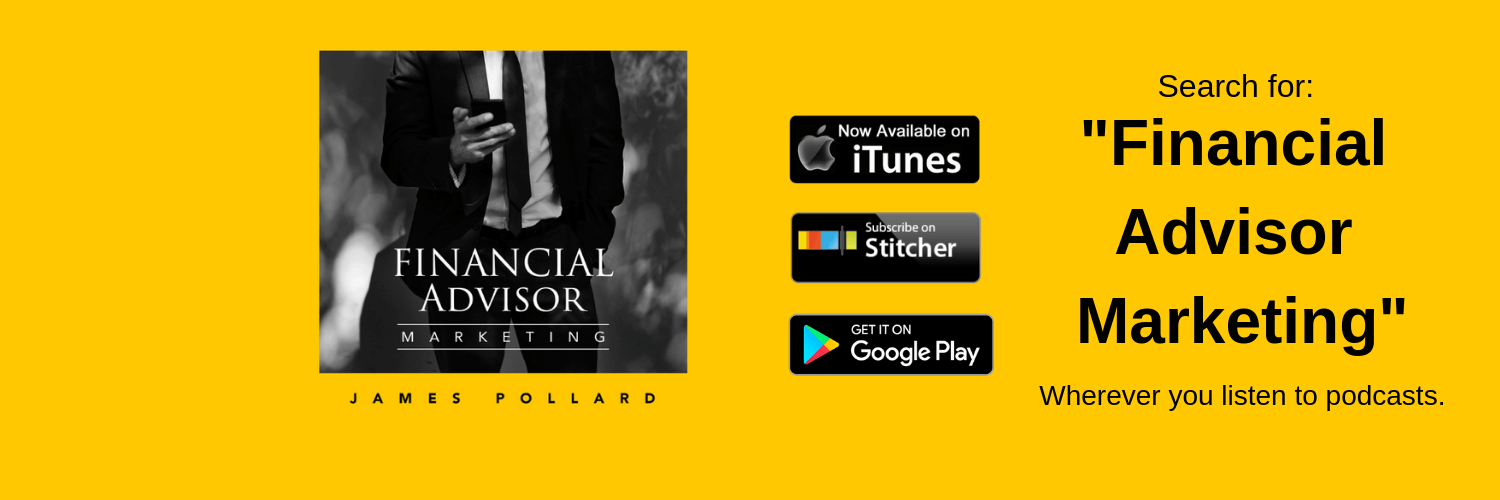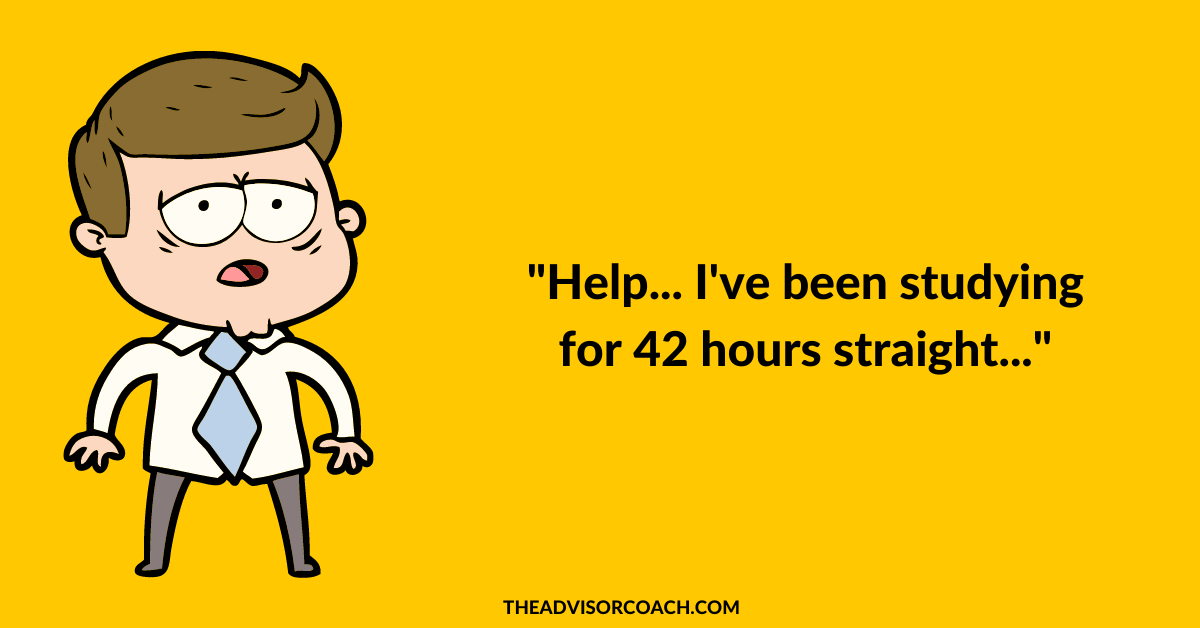How Hard Is The CFP® Exam? (Plus 5 Of My Favorite Tips to Help You Pass)
Because I’m known as the guy who helps financial advisors get more clients (through my newsletter, weekly podcast, etc.), one of the most common questions I get from financial advisors is:
“How hard is the CFP® exam?” First, let me explain that you can have a jumble of alphabet soup after your name, but if you can’t get clients, it doesn’t matter. I know so many advisors who are like walking encyclopedias. They have read so many personal finance books, know all types of studies, and can recite statistics verbatim. However, they can’t build a book of business to save their life. Which means they can’t help as many people as they want and build the life they deserve. It’s heartbreaking, really. So, before you read this article about how hard the CFP® exam is, I want you to realize that just as you study for the CFP®, you should study marketing and business-building. Because if you can’t get clients as a financial advisor, none of your certifications will get put to good use. Okay, let’s get on with the show… How Hard Is The CFP® Exam?Depending on which study you read, the overall pass rate for the CFP® exam hovers around 60%.
Alas, don’t despair because it doesn’t mean you can’t pass. Just understand that the CFP material is vast and comes from both education AND experience. Because while education and courses can give you a solid foundation, nothing comes close to working for a good company which follows the CFP® process. I’m going to assume that you’re reading this as a prospective CFP® who has no degree which would eliminate the need for education courses. First, I would recommend setting a date for the exam and etching it into your calendar. Most people recommend at least two years to go through the process, but it can be done sooner if you’re motivated and willing to work hard. When it comes to your study material, you should order a self-paced program. Why self-paced? Because everybody learns at different rates. Having a course with weekly installments (or something similar) will be too fast for some people and dreadfully slow for others. As you’re going through your study programs, stay focused on the big picture items. Don’t get bogged down in the dollar limits on contributions to IRAs, exemptions, phase-outs, etc. because these are always changing. Plus, once you’re a CFP® you’ll have a bunch of Continuing Education anyway. Cost of the Exam
At the time of this writing, the standard registration fee is $725. The early bird registration rate of $625 is available until six weeks before the registration deadline. A late registration rate of $825 applies during the last two weeks of the registration deadline.
Keep in mind that’s just the cost of the exam itself. Review materials and/or classes will cost anywhere from a couple hundred bucks to more than a thousand dollars depending on what you choose. Which means you better get ready to bust open that wallet just to take one of the most stressful exams of your life. Yay! CFP® Exam Topics
The exam itself is six hours long (two 3-hour sessions with a 40-minute break in between).
The topics tested on the exam are essentially CFP® Board’s 8 Principal Knowledge Topic categories. All of the questions will relate to one of these eight topics. The topic categories, and their weight on the exam, are as follows:
There’s no single topic that dominates the curriculum, so make sure you study all eight of these. However, the three topics at 17% may warrant additional study. Candidates should spend at least 250 hours studying. Please don’t take this suggestion lightly because you have a lot of material to cover. Starting early and sticking to a regimented study schedule will help you stick to it. If you’re studying for a year (52 weeks), it means studying approximately 4.8 hours per week. If you round it up, that’s an hour per day, every weekday. Some people like to study for an hour when they get home, while others like to batch their study time together on the weekends. Do it however works for you - just make sure you get your study time in. Also, make sure you take your time to think about real-world scenarios when you’re studying. The CFP® isn’t just about memorizing a bunch of terms and statistics. The exam tests your ability to perform the tasks expected of someone with the credential, which means you need to know how to apply what you learn. Many people who take the exam have already gone through several other exams for insurance and securities licensing. Unfortunately, this can set up a false expectation for what the CFP® will be like. People think, “I passed the Series 7… I’ll be fine!”... Wrong. You won’t be fine. Because while the other licensing exams focus on rote memorization, the CFP® is all about applying the information to real-life scenarios. Finally, make sure you practice quite a bit. Going through practice questions is a great way to build confidence. Imagine passing a few practice exams before taking the real thing - you’d feel a heck of a lot better than someone who didn’t practice at all. Practice helps you assess your grasp of the material and shore up your weak points. When you go through practice exams, you can see the mistakes you made and figure out why you made them. This will keep you from making the same mistakes on the real exam. In fact, if I had to pick the single biggest reason why people fail the CFP® it would be because they didn’t practice enough. There’s something about going through it again and again that makes otherwise foreign concepts “click” for you. When that happens, you’ll be on your A-game. Besides, the exam is LONG (six hours, although there is a break). Which means if you aren’t used to sitting down and answering questions for that long, you might burn yourself out. I’ve heard lots of stories of advisors who mentally hit a wall in the second half and they’re sure it tanked their scores. Don’t let that happen to you. Train for the endurance aspect of the test, too. The Most Difficult (And Important) Part of The Test
Nearly everybody who has taken the exam agrees that the case studies are the most difficult portion of the test.
The exam has 170 multiple-choice questions, with some based on case-studies or scenarios. This is why it’s critical for you to know how to analyze and think through them. Case studies describe a hypothetical client’s scenario. It may include information such as age, physical health status, plus any other details about that person. Sometimes these case studies will include divorce or other issues, such as a child who won’t stop spending money. These case studies can also include cash flow statements, balance sheets, business assets/liabilities, insurance, coverage, wills, trusts, etc. That’s a lot of stuff, I know. That’s why I emphasized how important it was for you to know all of these concepts and how they work together in a big-picture format. Because you’ll approach a young person getting a divorce differently than you will a ready-to-retire person who just sold a business for millions. You must be able to evaluate, synthesize, and apply the information you learn when answering questions. These case study questions force you to determine what rule or topic pertains to the information presented. For example, a case study may try to get you to examine if a client’s portfolio has too much or the right kinds of risks. This means you’ll have to be familiar with the characteristics of each investment to evaluate the situation. My Personal Advice…I get asked lots of questions from new and experienced financial advisors alike. The purpose of this article is to lump together a lot of my favorite study tips and recommendations to help you pass the CFP® exam. So, if you listen to my podcast or have bought any of my products and ask me a question about studying, don’t be surprised if I send you this article. :-)
1. Build Your Foundation First
You wouldn’t try to build a skyscraper without building a deep, solid foundation, right? Well, why would you tackle the CFP® without your foundation?
Too many advisors jump into the studying part too quickly. Instead, they should buy a few books on memory and learning first. Imagine developing a few advanced learning strategies to learn faster and remember more. Don’t you think that would help you learn the material faster? Remember this quote from Abraham Lincoln: “Give me six hours to chop down a tree and I will spend the first four sharpening the axe.” Hopping right into the financial planning study materials is like trying to cut down a mighty oak with a dull axe. Also, I’ve found that taking a speed reading course is one of the best ways to train your brain. In fact, I was able to triple my reading speed in a few weeks while still maintaining 90% comprehension. If you’re interested in reading my story, here it is: How I Tripled My Reading Speed In Two Weeks… And Why I Think You Can Do It Too… Of course, I’m not suggesting that you speed through your CFP® study material. Yet, learning how to speed read helps your brain sift through information and retain the most important concepts. Being able to do that will give you an advantage over everyone else. 2. Get Someone Else to Explain Concepts To You
If you’re struggling with a particular concept, reach out to experienced advisors at your firm and ask to speak with them. If you don’t have any advisors at your firm, reach out to experienced advisors on LinkedIn. Offer to compensate them if you must.
I’ve found that having simple, plain-English conversations about how the study material plays out in the real world tends to crystallize everything in the advisor’s mind. 3. Pack a Healthy Lunch
Another silly mistake people make when taking the exam is going out for fast food during the break. Don’t do this! If you eat a bunch of crap, you’ll destroy your mental clarity. You’ll probably feel tired and sluggish and it will impact your test score.
Take a kale salad with salmon and blueberries or something. Give your brain the “brain food” it needs to perform. 4. Bring a Pair of Backup Batteries
You don’t want to run out of battery power during your exam. This is an easily preventable mistake. Simply bring a pair of backup batteries and/or put fresh ones in your calculator the night before.
Also, make sure you get to know your calculator. If it’s one that you’ve used before and you’re comfortable with, use that one. There’s no time to figure out the functions while taking the test. 5. Don’t Compare Yourself to Others
If you decide to join a study group - there are a bunch of them online - then don’t make the mistake of comparing yourself to others.
People compare practice scores all the time. Other people’s scores literally have NOTHING to do with you. You are the only person who matters when it comes to passing your test. I’ve seen a lot of advisors who saw others scoring 80s while they were only getting 50s and got depressed. Just keep putting the work in, and the results will come. Besides, you don’t have to get a perfect score on the test - you just have to pass. Recommended CFP® Study Material
One of the most highly reviewed programs is one called The Dalton Review®. One thing people like about them is that they have a guarantee that you’ll pass the exam the first time or they’ll refund 100% of your enrollment costs. All you have to do is score 70% or better on their exam readiness quiz.
Another good one is from Kaplan® - they offer exam prep review, which includes a full array of prep products to help you pass. Before you blindly take my recommendations for study materials, please do your own due diligence and evaluate these before getting them. Different people have different preferences, which means the program that’s hailed as the best for one person may be terrible for another. One of the reasons I’m telling you to do your own due diligence is because when someone passes the exam using a particular program, that person will often tell others how great the course was. This creates what’s known as a “Texas sharpshooter fallacy”, where differences in data are ignored while similarities are overemphasized. After all, only successful individuals will recommend the course they took… nobody who failed is going to make the same recommendation. Got it? That’s why instead of selecting a course based on recommendations, you will be better served by doing research to see if your preferred learning style is conducive to one of the courses more so than the others. Especially since the courses aren’t cheap. The Bottom LineThere’s no arguing that the CFP® exam is tough. Just look at their low pass rates. However, by creating the right game plan and sticking with it, you can be in the “passing” group.
Take care of yourself, be diligent, and don’t be afraid to ask for help. Never forget that your goal is to pass the exam, not to protect your ego. I wish you the best! Feel free to get in touch with me and let me know how everything goes if and when you take the exam. 😎 |




